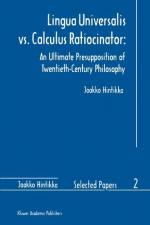|
This section contains 1,053 words (approx. 4 pages at 300 words per page) |

|
Consider the following famous example from Bertrand Russell.
- The present king of France is bald.
According to Russell, (1) is false because it asserts the existence of the present king of France. However, following P. F. Strawson (1952), a number of philosophers and linguists have maintained that, if there is no present king of France, an utterance of (1) fails to have a determinate truth-value—in Strawson's words, the question of whether (1) is true or false "does not arise." On this view, (1) therefore does not assert or even entail the existence of the present king of France but rather "presupposes" his existence.
The Range of Phenomena
Sentences like (1) are argued to presuppose the existence of a particular individual, but there are many other "presupposition" effects. It has been argued, for example, that factive verbs such as know and regret presuppose the truth of their complement clauses and that "certain aspectuals"—a...
|
This section contains 1,053 words (approx. 4 pages at 300 words per page) |

|


